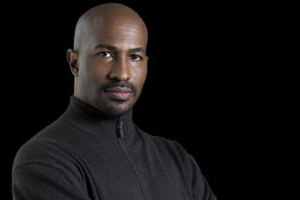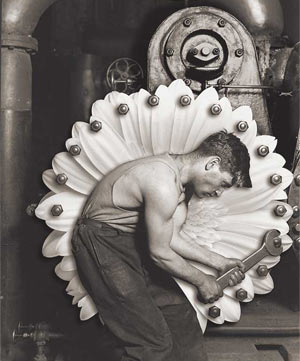
Photo courtesy Green For All
Update: Since this interview, Van Jones was named a Special Advisor to President Obama and has joined the White House Council on Environmental Quality (CEQ).
Mother Jones: Can you briefly explain what “environmental justice” means to you?
Van Jones: Environmental justice is the movement to ensure that no community suffers disproportionate environmental burdens or goes without enjoying fair environmental benefits.
MJ: What’s the relationship between environmental justice and sustainability?
VJ: Well, the only reason that we have the unsustainable accounting that we have right now is because incinerators, dumping grounds, and sacrifice zones were put where poor people live. It would never have been allowed if you had to put all the incinerators and nasty stuff in rich people’s neighborhoods; we’d have had a sustainable economy a long time ago. We’d have had a clean and green economy a long time ago. It’s the environmental racism that allowed the powerful people in society to turn a blind eye for decades to the downsides of the industrial system that got us to this point. So there’s a direct relationship between environmental racism and the lack of sustainability of society as a whole. We were the canaries in the coal mines, crying for relief. Now finally the consequences are affecting everyone, with global warming and everything else. The other thing is that the environmental justice agenda is also changing. Before, it was much stronger on demanding equal protection from environmental bad. Now we are also demanding equal opportunity and equal access to environmental good. We don’t want to be first and worst with all the toxins and all the negative effects of global warming, and then benefit last and least from all the breakthroughs in solar, wind energy, organic food, all the positives. We want an equal share, an equitable share, of the work wealth and the benefits of the transition to a green economy.
MJ: How do green-jobs initiatives fit into this picture?
VJ: Senators don’t install solar panels. You have to have the right policies, but it’s also a lot of just physical labor to retrofit a whole country. There’s going to be a lot of jobs weatherizing buildings, putting up solar panels, manufacturing parts for wind turbines and wind towers. All that’s work, and we want to make sure that the green economy is an equal-opportunity, diverse economy that can lift millions of people out of poverty. We don’t want it to be an ecoapartheid economy where the vast majority of the owners and workers and consumers and beneficiaries of the green economy are all one race.
MJ: There’s been some criticism that the green-jobs movement is overhyped.
VJ: It’s easy for people to say that, but it’s a movement that’s two years old. There are movements for education reform that are 30 years old and don’t have a single victory. I guess they’re probably overhyped too. On the one hand, the green-jobs movement has been overhyped if people think that we’re somehow going to have a green utopia, and everybody in America’s going to have a job putting up a solar panel everyday, and that day will be a week from next Thursday. I mean, that’s overhyped. But the reality is that there are either going to be a whole lot more green jobs or we’re going to have a dead planet. It’s become kind of fashionable to pooh-pooh it. I’ve never seen a movement two years old expected to have already changed the country. The civil rights movement took several decades. The women’s rights movement took several decades. Other environmental movements are taking several decades. We need to give the green-jobs movement at least a chance to turn green before we declare it dead.
MJ: Some environmentalists argue that the transition to green jobs is not happening fast enough. Does the movement need more energy behind it?
VJ: Let’s just quit. I think we should just quit. It’s too late. We should give up. [Laughs.] Look, nothing’s happening fast enough. You may have noticed there’s this jackass in the White House that’s not letting anything happen, whether you’re talking about health care or getting out of the war or fixing the energy crisis or solving global warming or getting the economy to work. So right now nothing’s happening. It’s a tragedy. This is a very new movement. There’s a consciousness changing moment that’s happening right now where people are starting to realize that we’ve got to put these two things together: fixing the economy and fixing the environment. It’s probably been in your mind for a while, but we didn’t even have the language for it ’til three years ago. So, yeah, we need to step on the gas here, or step on the pedal, or whatever you step on in the green economy.
MJ: Who in politics understands the green economy, and who is writing some good legislation and moving in the right direction on the green-jobs issue?
VJ: Massachusetts just passed something yesterday where they’re moving millions of dollars into green-jobs programs and making sure low-income people and people of color have a real shot. Just to make this perfectly clear, the holdup for green jobs is the holdup for the green economy as a whole, and the holdup for the green economy as a whole isn’t about consumer demand, isn’t about the lack of technology, or anything like that—it’s a political logjam. The rules have to be changed to punish the polluters and reward the problem solvers. It’s still free to dump carbon by the ton even though it’s going to cost us the whole planet. It’s still free to you, it’s still free to ExxonMobil, and it’s still free to the coal plants. As long as that’s true, as long as the rules favor the problem makers, the problem solvers are going to be struggling to break out of very narrow, niche markets. When you’re dealing with the problem solvers in the solar industry, wind industry, organic food industry, still trapped inside of little niche markets. The minute the rules change so that we punish the polluters, so the polluters have to pay, and the people who are doing things in a clean and green way are benefited, which can happen within the year, then you’re going to see a massive transfer of both public and private capital into the clean and green sector. You’re going to see a huge uptick in jobs.
Now, the real question is who’s going to get those jobs. Everybody thinks the people who do venture capital are geniuses because they’re making economic bets on the future. Well, the green-jobs movement is doing “venture policy,” “venture politics.” We’re making a political bet on the future. We’re making a political bet that this country is smart enough to change the rules in a sane direction. When the government moves, then capital will move, and when capital moves, then jobs will be created. We want to say very early and very loud, not after we see the big green economic boom, the real boom that’s coming, but before, that the jobs question is critical, justice is critical, equal opportunity is critical, and pathways out of poverty are critical. We raised it early, deliberately, and on purpose. Now people are saying, “Okay, well, you raised it; where are the jobs?” The whole point is that we’re raising it before it’s over, before it’s too late. Why are we so clear about this? We’re so clear about this because with the Silicon Valley tech boom, communities of color, poor people got nothing out of it. By the time we got into the argument, to talk about “Let’s close the digital divide,” the only thing Silicon Valley could think of to do is to give us recycled computers. Wealthy elites and also just good hardworking college kids went on to making billions of dollars, and we got recycled computers. We don’t want, having already fought the digital divide in the ’90s, to now have to deal with an eco divide.
MJ: How do we get to the tipping point where the rules change. Does it have to come from the very highest levels?
VJ: The change has got to be top down, bottom up, and inside out. The federal government has to get off the bench. Or frankly the federal government has to put down its pompoms for the polluters and put on the cleats and get on the side of our team trying to solve this problem. That’s critical. Otherwise, we’re going to have patchwork solutions, every state, every city going its own way. We’re not going to win with that. We also have to have bottom-up solutions in terms of communities, cities, mayors, community colleges, local labor unions, local business councils, all in their own ways beginning to move to a cleaner, greener, more sustainable economy. But probably the biggest change is what I call the inside-out change. Each individual has got to have a big change of heart here in terms of not only respecting the earth more, but also respecting each other more, and insisting that this green economy not have any throwaway resources, or throwaway species, but also that it doesn’t have any throwaway people or children or neighborhoods.
MJ: What are some of the policies that you’re envisioning would create this more level green-jobs market?
VJ: It’s a two-part answer. First you’ve got to have a green economy. Then you’ve got to make it just and inclusive. You’ve got to put a price on carbon; that’s got to be a top priority for the new administration.
MJ: Do you favor a carbon tax or a carbon trade?
VJ: I don’t care. I just say cap, collect, and invest. Cap carbon. We want a radical reduction in carbon. We support Al Gore’s call for 100 percent renewable in 10 years. We think it’s the only call that makes any sense given the science. We want a really aggressive cap. We want to make the polluters pay. We don’t care if they pay by buying permits or paying taxes. It really doesn’t, at the end of the day, matter a whole lot as long as the price is right and there aren’t a whole lot of giveaways. We say take the money from the carbon proceeds, whether it’s carbon taxes or a sale at auction, and a cap-and-trade system and invest that money in jobs, transportation, and new technology via weatherization crash programs, the weatherization and solarization of the country. So people get in a big fistfight about taxes versus cap and trade. We don’t care how the money comes in. We just want to make sure the money comes in and is invested in people and not just handed right back to the polluters.
MJ: What’s your take on whether or not buying and producing new things is inherently unsustainable?
VJ: It probably is. We are going to have steps and stages here. The first step is going from just grey, dirty, suicidal capitalism that doesn’t even try to take account of any sustainability at all to a form of capitalism that does. But then you’ve still got to have probably growth featured—that’s more quantitative than qualitative and therefore still not sustainable. We’ll have to keep moving from there.
MJ: If the green movement gets overhyped, do you think people might lose interest, get sort of burned out?
VJ: That’s a valid fear. But it’s mainly a valid fear among people who are into political fads. It’s not a valid fear among people who don’t have a job. It’s not a valid fear among people who would love to have their homes weatherized and solarized and use government programs, or at least a functioning solar company with actually green-collar workers. It’s not a fad or a point of burden for people who need healthy food in their communities. There’s the political class, the political elite, and what they jump up and down about, and then there’s reality. And in reality, if we’re going to get through this ecological and social crisis, there’s a lot of work that has to be done. That’s going to be called “green-collar work” or “green work”—we’re going to fight over the definition. It’s not all going to happen overnight. It’s not going to be distributed fairly. There’s going to be fights over wages, and working conditions, and that kind of stuff. But these issues are not going to go away just because we get bored by talking about them.
MJ: With all of the excitement about the green economy, is there a danger we’re creating a green bubble?
VJ: The question of the green bubble is objectively overstated right now. There will be a green bubble, in that there will be way too many good dollars chasing green projects and green technologies than there are good projects and good technologies out there. That will happen. That’s a natural part of any of these transitions. You’ll have too much skepticism at first. You’ll have “irrational exuberance,” as Alan Greenspan said, and then you’ll have some kind of correction. But we are far from that. I mean, the entire venture capital outlay last year for all clean tech was about $5 billion. That’s nothing. At the top of the tech bubble you had $100-plus billion a year, every year. So we’re a long way from a green bubble on the tech side. I think that will happen. Hey, everyone wants to fix these problems with the market, and that’s a part of what you buy with that. Otherwise you’ve got the government doing it directly and you’ve got a different set of problems. If you use markets, you’re going to risk bubbles.















